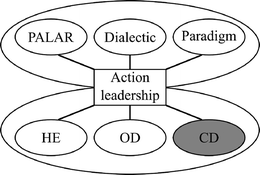Chapter Overview
This chapter focuses on applications of participatory action learning and action research (PALAR) to community development. I argue that beyond education and development through formal institutions, PALAR is practicable and especially suitable to the development of lifelong learning and action leadership for individuals, groups and whole communities, especially in developing countries and in natural-disaster crisis situations. This knowledge claim is substantiated by examples of community development in many parts of the world – from both the literature and my own experience. The new concept of PALAR is important in this chapter because both action learning and action research need to be participatory in the three areas discussed: (1) community development, (2) action leadership development and (3) development of lifelong learning. This chapter introduces a new approach to development that serves all three areas. The new system using this approach, designed and offered by the Global University for Lifelong Learning (GULL), is explained and illustrated by examples from many parts of the world, including two case studies – of Haiti and of Samoan migrants in Australia. Only about 3 years old (at the time of writing), GULL has spread like a breath of fresh air across the world.
If you’ve come to help us, you are wasting your time. But if you’ve come because your liberation is bound up with ours, then let us work together.
Lilla Watson, Aboriginal social worker

Access this chapter
Tax calculation will be finalised at checkout
Purchases are for personal use only
References
Argyris, C., & Schön, D. A. (1974). Theory in practice: Increasing professional effectiveness. San Francisco: Jossey-Bass.
Covey, S. (1992). Principle-centred leadership. New York: Fireside.
Castillo-Burguete, M. T., Viga De Alva, M. D., & Dickinson, F. (2008). Changing the culture of dependency to allow for successful outcomes in participatory research: Fourteen years of experience in Yucatan, Mexico. In P. Reason & H. Bradbury (Eds.), Handbook of action research: Participatory inquiry and practice (pp. 522–533). London: Sage.
Fals Borda, O. (2006). The north–south convergence. Action Research, 4(3), 351–358.
Fletcher, M. A., & Zuber-Skerritt, O. (2008). Professional development through action research: Case studies in South African higher education. Systemic Practice and Action Research, 21, 73–96.
Fletcher, M. A., Zuber-Skerritt, O., Albertyn, R. M., Bartlett, B., & Kearney, J. (2010). Meta-action research on a leadership development program: A process model for life-long learning. Systemic Practice and Action Research (published online: 11 May 2010).
Godin, S. (2008). Tribes: We need you to lead. London: Penguin.
Guhathakurta, M. (2008). Theatre in participatory action research: Experiences from Bangladesh. In P. Reason & H. Bradbury (Eds.), Handbook of action research: Participatory inquiry and practice (pp. 510–521). London: Sage.
Hall, B. L. (2001). I wish this were a poem of practices of partipatory action research. In P. Reason & H. Bradbury (Eds.), Handbook of action research: Participatory inquiry and practice (pp. 171–178). London: Sage .
Heron, J., & Reason, P. (2001). The practice of co-operative inquiry: Research ‘with’ rather than ‘on’ people. In P. Reason & H. Bradbury (Eds.), Handbook of action research: Participatory inquiry and practice (pp. 179–188). London: Sage.
Jansen, J. D. (2009). Knowledge in the blood: Confronting race and the apartheid past. Stanford, CA: Stanford University Press.
Kretzmann, J., & Mcknight, J. L. (1993). Building communities from the inside out: A path toward finding and mobilizing a community's assets. Evanston, IL: Institute for Policy Research, Northwestern University.
Louw, I., & Zuber-Skerritt, O. (2009). Reflecting on a leadership development program: A case study in South African higher education. Perspectives in Education, 27(3), 237–246.
Maxwell, J. C. (1995). Developing the leaders around you: How to help others reach their full potential. Nashville, TN: Thomas Nelson Publishers.
Nyoni, S. (1991). People’s power in Zimbabwe. In O. Fals Borda & M. A. Rahman (Eds.), Action and knowledge: Breaking the monopoly with participatory action research (pp. 109–120). New York: Apex Press.
Okri, B. (1997). A way of being free. London: Phoenix.
Raelin, J. A. (2003). Creating leaderful organisations: How to bring out leadership in everyone. San Francisco: Berrett-Koehler.
Raelin, J. A. (2006). Does action learning promote collaborative leadership? Academy of Management Learning and Education, 5(2), 152–168.
Rahman, M. A. (1991). Glimpses of the "other Africa". In O. Fals Borda & M. A. Rahman (Eds.), Action and knowledge: Breaking the monopoly with participatory action research (pp. 84–108). New York: Apex Press.
Rahman, M. A. (2008). Some trends in the praxis of participatory action research. In P. Reason & H. Bradbury (Eds.), The Sage handbook of action research: Participative inquiry and practice (pp. 49–62). London: Sage.
Santos, D., & Todhunter, M. (Eds.). (2007). Action research and education in context of poverty: A tribute to the life and work of professor Orlando Fals Borda. Bogota: Ediciones UNISALLE.
Senge, P., & Scharmer, O. (2001). Community action research: Learning as a community of practitioners, consultants and researchers. In P. Reason & H. Bradbury (Eds.), Handbook of action research: Participatory inquiry and practice (pp. 238–249). London: Sage .
Stringer, E. (2008). ‘This is so democratic!’ Action research and policy develoment in East Timor. In P. Reason & H. Bradbury (Eds.), Handbook of action research: Participatory inquiry and practice (pp. 550–561) London: Sage.
Swantz, M.-L. (2008). Participatory action research as practice. In P. Reason & H. Bradbury (Eds.), Handbook of action research: Participatory inquiry and practice (pp. 30–48) London: Sage.
Swantz, M.-L., Ndedya, E., & Masaiganah, M. S. (2001). Participatory action research in southern Tanzania with special reference to women. Handbook of action research: Participatory inquiry and practice (pp. 386–395). London: Sage.
Zuber-Skerritt, O. (2009). Action learning and action research: Songlines through interviews. Rotterdam: Sense Publishers.
Author information
Authors and Affiliations
Corresponding author
Rights and permissions
Copyright information
© 2011 Springer Science+Business Media B.V.
About this chapter
Cite this chapter
Zuber-Skerritt, O. (2011). Community Development. In: Action Leadership. Springer, Dordrecht. https://doi.org/10.1007/978-90-481-3935-4_7
Download citation
DOI: https://doi.org/10.1007/978-90-481-3935-4_7
Published:
Publisher Name: Springer, Dordrecht
Print ISBN: 978-90-481-3934-7
Online ISBN: 978-90-481-3935-4
eBook Packages: Humanities, Social Sciences and LawEducation (R0)


